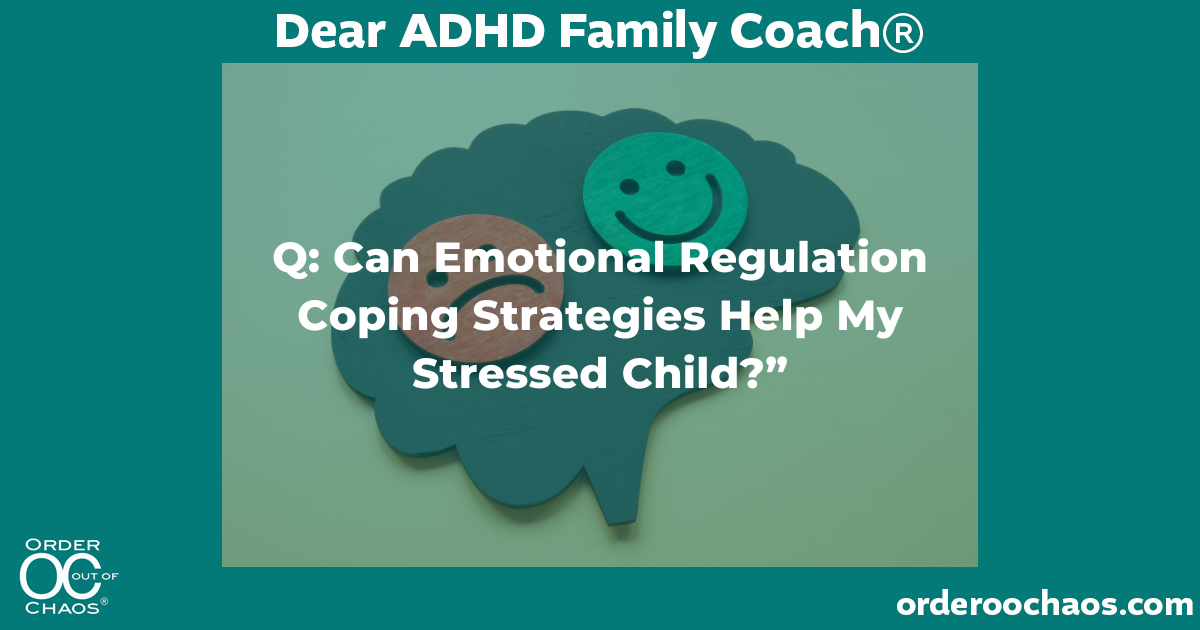Q: Can Emotional Regulation Coping Strategies Help My Stressed Child?
Coping strategies, such as establishing a routine and a calm environment, teach children with ADHD emotional regulation skills and how to focus.
This Dear ADHD Family Coach® column was originally written for ADDitude Magazine.
Q: “My child becomes stressed and angry when he can’t focus on schoolwork. How can I redirect and reduce his frustration?” — JoburgMom
Hi JoburgMom:
When a child feels overwhelmed and unable to focus on schoolwork, it’s crucial to provide guidance and support to reduce that frustration. Providing them with coping strategies that are age-appropriate and doable can be effective in alleviating their feelings of anger or helplessness. Here are additional suggestions on how you can support your child.
Validate their Feelings
This is always the place to start. Avoid saying common phrases such as, “You’re being ridiculous” or “If you would just start, you’ll just be able to focus.” Or even, “You can do it!” Instead, start by acknowledging your child’s stress and frustration. Let them know it’s normal to feel overwhelmed at times and that you understand their struggles and will help them with emotional regulation skills.
Here’s a great way to think about it. Validating their emotions creates a safe space to express their feelings and work out solutions that feel right for them. Make sure to praise their efforts and progress, even small ones. Let them know that mistakes are a natural part of the learning process.
[READ: Why Does My Son Meltdown When It’s Time to Study?]
Create a Calm Environment
Notice that I didn’t say a quiet one. For some students with ADHD and executive functioning challenges, a quiet environment is distracting. Many need the hum of the house or background noise to help them focus. Make sure your son’s homework environment is set up so it works for him. Does he like to listen to music? Does music help him feel less stressed? More activated? Have him create a study playlist filled with his favorite tunes. When it’s time to hit the books, he can study along to the music.
If he needs a noisy environment to stay on task, set him up with a workstation close to where the action is in your home. Just ensure that the other household members don’t disturb him once he starts working.
[READ: Shouldn’t My Child Sit at a Quiet Desk for Homework?]
Does he need to fidget to focus? If that’s the case, create separate stations around your home where he can move to complete different subjects. For example, math can be done at the kitchen table, science in the living room, and so on. Movement helps to lay down learning and helps us initiate and stay focused.
Break it Down
I mean all the way down. When facing a large assignment or complex problem, tackling it in its entirety can create overwhelm. Work on one math problem, write one paragraph, define one vocabulary word, etc. You get the idea. By breaking tasks into smaller, more manageable chunks, your son can tackle one piece at a time, sustain focus, and reduce stress.
Establish a Routine
Students with ADHD and executive functioning challenges crave routines and structure. They provide stability and predictability, which may reduce your son’s anxiety and increase his ability to concentrate. If possible, set specific times to do homework and stick to it. And don’t forget to schedule breaks. They are a must for soothing the brain.
Engage the Senses
Don’t underestimate the power of introducing calming elements, such as soft music, candles, essential oils (my favorite!), stress balls, or fidget toys. My college-age student coaching clients love a brand called Yogi. They make fidget toys and spinners styled for older kids. All these types of supports provide a sensory outlet and promote relaxation.
[READ: How Can I Motivate My Son In a Positive Way?]
Consider Alternative Learning Approaches
If traditional learning methods aren’t working, explore alternative approaches that cater to your son’s individual needs. Try incorporating visual aids, hands-on activities, interactive learning tools, and other coping strategies that can make the learning process more engaging and enjoyable for him.
Here’s some more food for thought: Homework is the last thing your son wants to do. So, it’s important to tap into what truly works best for your son to learn. Building a roadmap that honors his strengths and needs will give him the tools and resources to maximize and strengthen his homework muscle.
By creating a Personal Homework Profile, he can take a more holistic approach that focuses on his best practices for getting work done.
Good luck!
OUR MISSION
Order Out of Chaos’ mission is to provide hands-on education, guidance, and coaching to parents and their students through our customized products and programs, so all children – both mainstream and with learning difficulties – can develop the necessary skills needed to experience success in learning and in life.
WANT MORE TIPS AND TOOLS LIKE THESE?
Sign up for our popular monthly newsletter and have our latest articles, resources and events delivered directly to your inbox. Trust us. You will LOVE it!
SIGN ME UP NOW!
DISCLOSURE:
Order Out of Chaos is a participant in the Amazon Services LLC Associates Program, an affiliate advertising program designed to provide a means for sites to earn advertising fees by advertising and linking to amazon.com.




